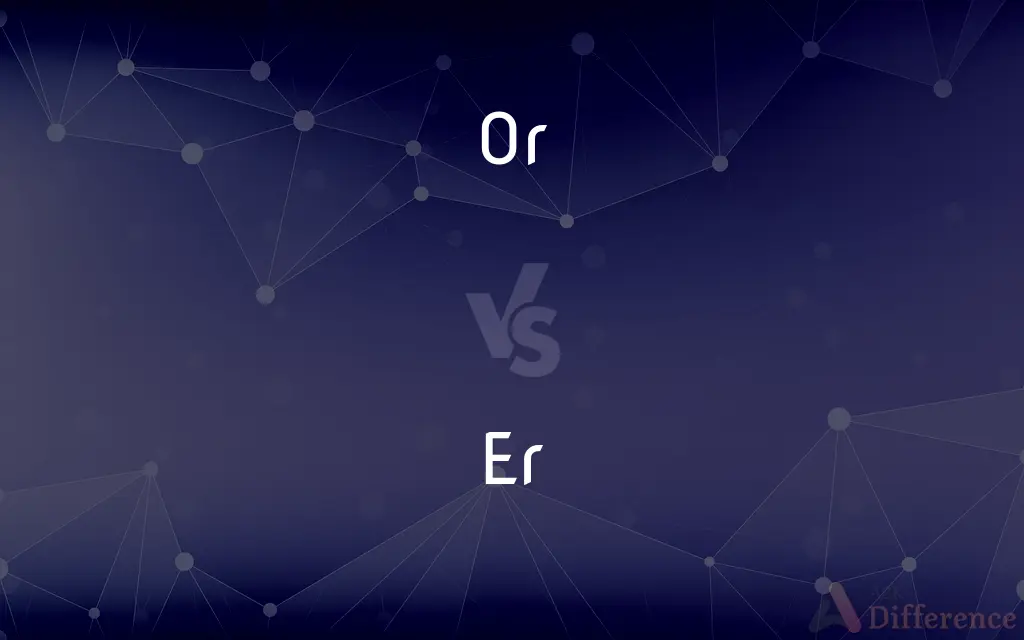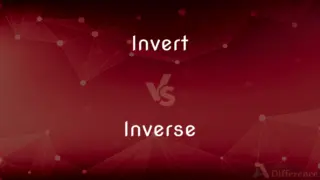Or vs. Er — What's the Difference?
By Tayyaba Rehman & Urooj Arif — Updated on May 6, 2024
"Or" is a conjunction used to link alternatives in a sentence, indicating a choice, whereas "er" is primarily an interjection expressing hesitation or pause in speech.

Difference Between Or and Er
Table of Contents
ADVERTISEMENT
Key Differences
"Or" is used as a coordinating conjunction in English, designed to connect words, phrases, or clauses that represent alternatives or choices. Whereas "er" serves as a filler or hesitation marker in spoken English, often used when the speaker is unsure or pausing to think.
In sentence structure, "or" plays a critical role by providing options, such as in the sentence "Would you like tea or coffee?" On the other hand, "er" does not contribute to the grammatical or logical flow of a sentence but indicates a momentary lapse or search for words, as in "I was going, er, to the store."
The usage of "or" is strategic in arguments and decision-making scenarios, clarifying possible outcomes or choices. Whereas, "er" typically appears in casual or informal speech, reflecting spontaneous thought processes and uncertainties.
While "or" can appear in both written and spoken English, maintaining clarity and precision in communication, "er" is almost exclusively used in spoken English and rarely found in formal writing, except when directly quoting speech.
"Or" is straightforward and lacks emotional connotations; it simply denotes alternatives. In contrast, "er" can convey hesitation, doubt, or a cognitive pause, adding a human element to speech.
ADVERTISEMENT
Comparison Chart
Part of Speech
Conjunction
Interjection
Function
Links alternatives or choices
Indicates hesitation or thinking pause
Usage Context
Both written and spoken English
Primarily spoken English
Example Sentence
"Would you like tea or coffee?"
"I think, er, I left my keys at home."
Emotional Connotation
None
Can indicate uncertainty or doubt
Compare with Definitions
Or
Used to connect different alternatives.
You can either stay here or come with us.
Er
Used to signal a pause in speech.
Er, what was I saying?
Or
Indicates a choice between words.
Is the car blue or green?
Er
Indicates uncertainty or doubt.
I will, er, try to be there.
Or
Appears in either/or structures.
Either you leave now or you stay till the end.
Er
Fills a gap while thinking.
We should meet at, er, six?
Or
Can introduce a synonym or explanation.
A sofa or, in other words, a couch.
Er
Often used to soften statements.
You are, er, a bit late.
Or
Used in conditions or stipulations.
Correct your errors, or the submission will be rejected.
Er
Can precede correction or modification of speech.
It was, er, actually yesterday.
Or
Used to indicate an alternative, usually only before the last term of a series
Hot or cold.
This, that, or the other.
Er
Used to express hesitation or uncertainty.
Or
Used to indicate the second of two alternatives, the first being preceded by either or whether
Your answer is either ingenious or wrong. I didn't know whether to laugh or cry.
Er
Said when hesitating in speech.
Or
(Archaic) Used to indicate the first of two alternatives, with the force of either or whether.
Er
(informal) To utter the word "er" when hesitating in speech, found in the phrase um and er.
He ummed and erred his way through the presentation.
Or
Used to indicate a synonymous or equivalent expression
Acrophobia, or fear of great heights.
Er
The chemical symbol for erbium, a rare earth element. It has atomic number 68 and an atomic weight of 167.26.
Or
Used to indicate uncertainty or indefiniteness
Two or three.
Er
A trivalent metallic element of the rare earth group; occurs with yttrium
Or
Before. Followed by ever or ere
"I doubt he will be dead or ere I come" (Shakespeare).
Er
A room in a hospital or clinic staffed and equipped to provide emergency care to persons requiring immediate medical treatment
Or
A logical operator that returns a true value if one or both operands are true.
Or
Gold, represented in heraldic engraving by a white field sprinkled with small dots.
Or
Before.
Or
(logic) An operator denoting the disjunction of two propositions or truth values. There are two forms, the inclusive or and the exclusive or.
Or
Otherwise a consequence of the condition that the previous is false.
It's raining! Come inside or you'll catch a cold!
Or
(tincture) The gold or yellow tincture on a coat of arms.
Or
(tincture) Of gold or yellow tincture on a coat of arms.
Or
(obsolete) Early (on).
Or
(obsolete) Earlier, previously.
Or
Before; ere. Followed by "ever" or "ere".
Or
A particle that marks an alternative; as, you may read or may write, - that is, you may do one of the things at your pleasure, but not both. It corresponds to either. You may ride either to London or to Windsor. It often connects a series of words or propositions, presenting a choice of either; as, he may study law, or medicine, or divinity, or he may enter into trade.
If man's convenience, health,Or safety interfere, his rights and claimsAre paramount.
Maugre thine heed, thou must for indigenceOr steal, or beg, or borrow thy dispence.
Or
Ere; before; sooner than.
But natheless, while I have time and space,Or that I forther in this tale pace.
Or
Yellow or gold color, - represented in drawing or engraving by small dots.
Or
A state in northwestern United States on the Pacific
Or
A room in a hospital equipped for the performance of surgical operations;
Great care is taken to keep the operating rooms aseptic
Common Curiosities
What part of speech is 'or'?
'Or' is a conjunction used to link alternatives in sentences.
Is 'er' acceptable in formal writing?
'Er' is generally not suitable for formal writing; it's mostly used in spoken English.
Can 'or' be used in both questions and statements?
Yes, 'or' can be used in both questions and statements to present options.
Is 'or' interchangeable with any other conjunctions?
'Or' is somewhat interchangeable with 'either,' especially in presenting choices.
What part of speech is 'er'?
'Er' is an interjection commonly used as a speech filler.
How does 'or' affect the meaning of a sentence?
'Or' introduces alternatives and affects choices presented in a sentence.
Can 'er' be used intentionally in speech?
Yes, speakers sometimes use 'er' intentionally to pause for thought or to be polite.
What is the primary function of 'or' in logic?
In logic, 'or' connects propositions in a way that if any is true, the compound statement holds true.
How does 'er' affect the flow of conversation?
'Er' can interrupt the flow of conversation, indicating hesitations or pauses.
Does 'er' have synonyms in speech fillers?
Yes, similar fillers include 'um,' 'ah,' and 'uh.'
Share Your Discovery

Previous Comparison
Invert vs. Inverse
Next Comparison
Fire vs. LavaAuthor Spotlight
Written by
Tayyaba RehmanTayyaba Rehman is a distinguished writer, currently serving as a primary contributor to askdifference.com. As a researcher in semantics and etymology, Tayyaba's passion for the complexity of languages and their distinctions has found a perfect home on the platform. Tayyaba delves into the intricacies of language, distinguishing between commonly confused words and phrases, thereby providing clarity for readers worldwide.
Co-written by
Urooj ArifUrooj is a skilled content writer at Ask Difference, known for her exceptional ability to simplify complex topics into engaging and informative content. With a passion for research and a flair for clear, concise writing, she consistently delivers articles that resonate with our diverse audience.













































